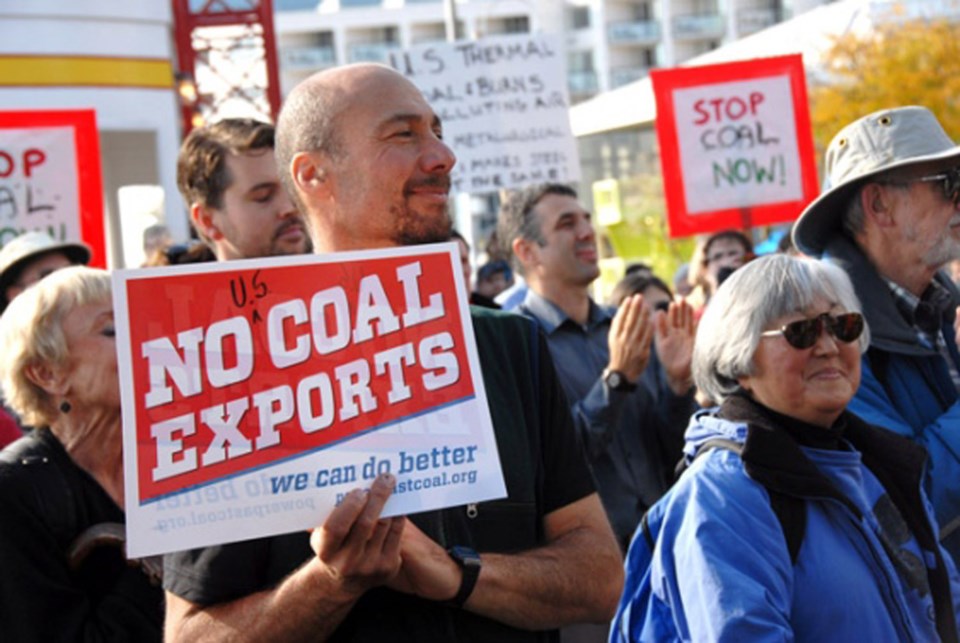Port Metro Vancouver and Fraser Surrey Docks are getting a lump of coal this Christmas from environmentalists for the environmental impact assessment done regarding a proposed coal facility in Surrey.
Communities and Coal, Dogwood Initiative, No More Coal Exports, Save the Salish Sea and Voters Taking Action on Climate Change recently joined forces to host an online conference where scientists and environmentalists commented on the assessment. Comments about the environmental impact assessment are being accepted until Dec. 17.
Laura Benson of the Dogwood Initiative said Port Metro Vancouver needs to scrap the environmental assessment that’s been done and start over and order a full health assessment. She noted that two of the region’s health officers have stated that the recently completed assessment doesn’t meet the most basic requirements of a health impact assessment.
Dr. Chris Carlsten, an associate professor and chair in occupational and environmental lung disease at the University of British Columbia, agreed. He said the environmental impact assessment conducted by SNC Lavalin for Fraser Surrey Docks didn’t use best practices for health effects analysis and “trivializes” the potential impacts of fugitive coal dust on workers.
“It’s a rather superficial document. It’s disappointing,” he said. “I am hopeful, as a physician, a scientist and a citizen that a better assessment will be put forth.”
Tyee Bridge, campaigns director at Fraser Riverkeeper Society, said the environmental impact assessment doesn’t address how much coal dust is produced by the facility or during the transport of the coal, almost suggesting the coal would create no coal dust.
“That is a position we would say is optimistic to say the least,” he said.
Noting that coal dust is a carcinogen in both human and marine environments, Bridge said it could be a “real problem” if train cars carrying coal are parked near the Fraser River. He also expressed concern about coal dust that would be generated as coal is dumped from train cars onto barges at Fraser Surrey Docks.
“That’s a very messy process,” he said.
Given the Fraser River is home to declining numbers of the endangered white sturgeon, Bridge said a “far more rigorous” assessment needs to be done about the risks on human and marine health. He’s concerned about the impacts that toxic coal dust would have on orca, salmon and herring species when it gets into the waterways.
“This report doesn’t tell us how much coal is going to escape,” he said.
Bridge also expressed concern that impacts the coal facility would have on wastewater systems hasn’t been addressed. He noted that equipment will be washed down, and it’s unclear whether the water will go into the Metro Vancouver sewer system or directly into the Fraser River.
"That is a lot of particulate matter going into our water supply,” he said.
Fraser Surrey Docks has applied to Port Metro Vancouver for a permit to operate a coal transfer facility, where coal arriving on trains from the United States would be loaded on to barges and shipped to Texada Island and then to China. It’s proposed that the facility would handle between four million and eight million metric tonnes of coal annually.
Andre Sobolewski of Clear Coast Consulting Ltd. is concerned about the potential effects of coal dust as the barges travel through the Strait of Georgia to Texada Island. He said the environmental impact assessment “totally ignores” the coast.
“We are in the dark, and we are concerned,” he said.
Given the currents, Sobolewski said it’s likely coal dust could end up on the Sunshine Coast and Vancouver Island shorelines, and in the marine environment, where it could be ingested by marine life.
Dr. Tim Takaro, a physician scientist at Simon Fraser University, said coal miners may suffer the highest exposure to coal and can get very sick at levels that are deemed to be legal, but that doesn’t mean there isn’t any risk for people exposed to lower doses of coal dust.
In August, Fraser Surrey Docks hired SNC-Lavalin to conduct an environmental impact assessment of its proposed coal transfer project at the site located on the banks of the Fraser River, specifically asking the consultant to assess the potential for the proposed facility to adversely impact the environment and human health. The assessment concluded the project will not cause significant adverse environmental, socio-economic or health effects.
At the time it released the assessment, Fraser Surrey Docks launched a 30-day period for the public to comment on the environmental impact assessment. Comments on the report are due by Dec. 17.
Paul Williams, cofounder of Communities and Coal, said the environmental impact assessment is “fatally flawed” and questions why Port Metro Vancouver is reluctant to ask for a comprehensive health impact assessment. Given the municipal opposition to the project and community concerns, she said an independent third-party assessment is needed, and suggested it would be “irresponsible” for Port Metro Vancouver to allow Fraser Surrey Docks to proceed with this projects.
Williams said Communities and Coal will encourage people to continue flooding the site with feedback and call for a full assessment and full public hearings. It is also calling on the provincial government to stand up on behalf of communities and individuals opposing the project.



